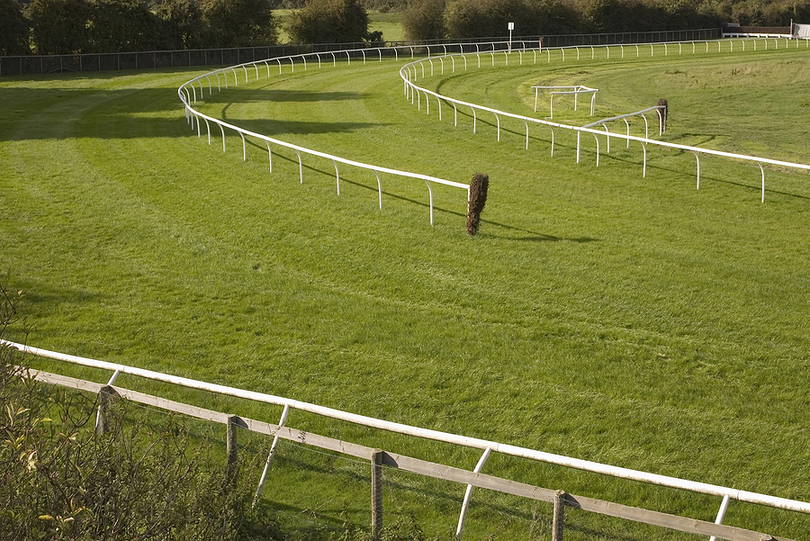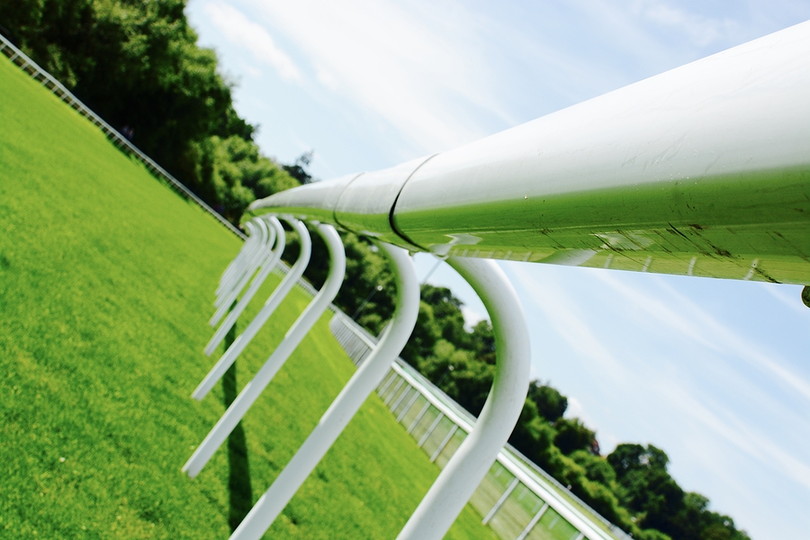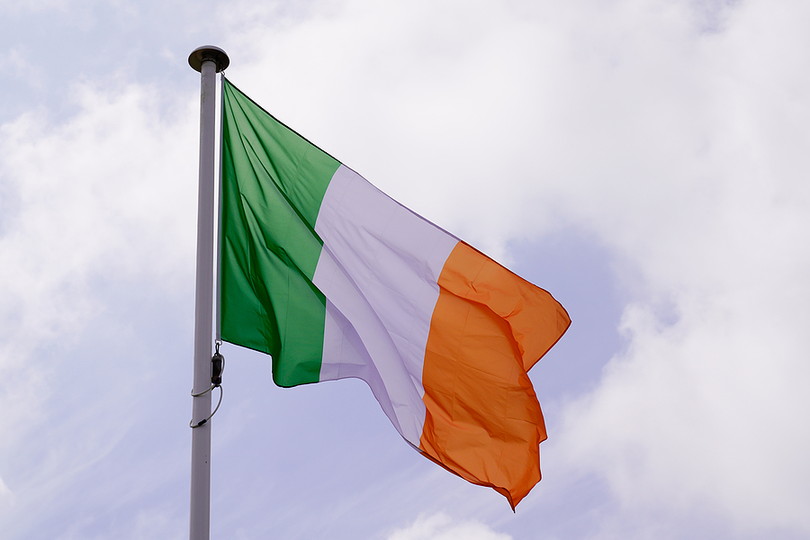 A day at the races is almost always a fantastic experience – even though your mood might be dampened somewhat if none of your bets come in. But going to race track on a Saturday has to be the best of all: for most people, there’s no need to take a day off work and if you happen to have a couple of celebratory drinks after you land a big winner, you still have Sunday to recover before the working week rolls around once again.
A day at the races is almost always a fantastic experience – even though your mood might be dampened somewhat if none of your bets come in. But going to race track on a Saturday has to be the best of all: for most people, there’s no need to take a day off work and if you happen to have a couple of celebratory drinks after you land a big winner, you still have Sunday to recover before the working week rolls around once again.
Although there are plenty of big race meetings and races that take place across the other days of the week, many of the biggest and best races take place on Saturdays. In this article, we’ll run through the best of them in the UK and we’ll also cast our gaze across the Irish Sea to check out the biggest Irish races that run on Saturdays. Note, this will not be an exhaustive list of all the Saturday races that racing fans might consider to be “big”. But rather it will give an overall snapshot of the most prestigious, highest-class contests that take place on our favourite day of the week.
Note that the distances are often to the nearest half furlong and the prize purses are based on the most recent renewals at the time of writing (so races that were run in 2021 or 2022). Race distances and purses are subject to change and will sometimes be approximate. Race names may also change periodically, especially those that include the name of a sponsor.
Biggest Jumps Races On Saturday

We’ll kick things off with the biggest Saturday races from the National Hunt side of horse racing in the UK. And it will come as a surprise to no one that a certain race from Aintree is the first to feature.
Grand National
- Course – Aintree, Merseyside
- Date – Early April
- Distance – 4m2½f
- Purse – £1,000,000 (winner: £500,000)
The biggest Saturday race in the UK is arguably the biggest race anywhere, anytime. The Grand National is certainly big when it comes to its physical attributes, both in the marathon distance and the size of the fences. But it is also the biggest when it comes to capturing the imagination of the public. Many people in the UK only watch or bet on one race each year: the National.
One of the reasons the Grand National has won hearts and minds over the years is that it regularly produces big stories. Whether it’s the three wins for the legendary Red Rum or Rachael Blackmore becoming the first female jockey to triumph in 2021, there’s always something to catch the eye… and there’s always the chance of landing a long-odds winner too. The huge fences create a spectacle like no other in racing and whilst picking the winner is something of a lottery (coincidentally Lottery was the first winner of the race in 1839!), this is a brilliant betting contest.
Liverpool Hurdle
- Course – Aintree, Merseyside
- Date – Early April
- Distance – 3m½f
- Purse – £250,000 (winner: £140,325)
Although very much on the undercard of the Grand National, the Grade 1 Liverpool Hurdle is a fantastic race in its own right and has many fans on Grand National Day at Aintree. Attracting the top staying hurdlers in the land, some of whom will have competed in the Stayers’ Hurdle at the Cheltenham Festival a month before, there have been some popular winners of this race since it was first run back in 1974. And none has proved more popular than Big Buck’s, who triumphed four years in a row from 2009 to 2012, the same years in which he also took victory in the Stayers’ Hurdle at Cheltenham (then called the World Hurdle).
Betfair Chase
- Course – Haydock Park, Merseyside
- Date – Mid-late November
- Distance – 3m1½f
- Purse – £200,000 (winner: £114,865)
A relatively new race compared to most on this list, the Grade 1 Betfair Chase was inaugurated in 2005. But since then there have been some cracking races and winners have included greats such as Kauto Star (four times), Cue Card (three times) and Bristol De Mai (three times). It doesn’t have the history or the draw of the Grand National, but the Betfair Chase is one of the best races in National Hunt racing when it comes to the quality of the runners and is much-loved by the sport’s biggest fans.
Paddy Power Gold Cup
- Course – Cheltenham, Gloucestershire
- Date – Mid-November
- Distance – 2m4f
- Purse – £158,000 (winner: £90,032)
This Grade 3 handicap chase is one of the big draws of the November Meeting at Cheltenham and the large field and 16 fences make it a tough one to win. It has gone by various names since its inauguration in 1960 (including the BetVictor Gold Cup from 2016 to 2020), and although it doesn’t have too many household names among its list of winners, the race is a favourite of punters seeking the thrills and spills of a steeplechase coupled with the chance of landing a winner at decent odds.
Ladbrokes Trophy Chase
- Course – Newbury, Berkshire
- Date – Late November
- Distance – 3m2f
- Purse – £250,000 (winner: £142,375)
Another highly regarded Grade 3 handicap, the Ladbrokes Trophy Chase (previously known as the Hennessy Gold Cup) has been around since 1957 and has proved a good training ground for future Cheltenham Gold Cup and even Grand National winners. Some of the best chasers in history have triumphed in this race, including legends such as Arkle and Denman who each won this one twice.
Tingle Creek Chase
- Course – Sandown Park, Surrey
- Date – Early December
- Distance – 1m7½f
- Purse – £150,000 (winner: £85,245)
Moving back up to Grade 1 level and this early-December steeplechase over just shy of two miles is one for the real speedsters. It only earned Grade 1 status in 1994, before which it was a handicap race, but since the upgrade it has seen some top quality winners. The likes of Moscow Flyer, Sprinter Sacre, Altior and Kauto Star have all triumphed in this race, though Flagship Uberalles is the only horse to have won it three times, doing so in consecutive years (1999, 2000 and 2001).
Long Walk Hurdle
- Course – Ascot, Berkshire
- Date – Mid-December
- Distance – 3m½f
- Purse – £105,000 (winner: £59,797)
Here we have a Grade 1 event for staying hurdlers and another of our Saturday contests that takes place in the month of December. Although Ascot is better known for its flat racing over the summer, this is one of the highlights to take place over obstacles at the course. Unsurprisingly, Big Buck’s three successes in this one (2009, 2010 and 2011) put him right up there, but dual Stayers’ Hurdle winner Baracouda went one better by winning this four times between 2000 and 2004 (he missed out in 2002).
Ascot Chase
- Course – Ascot, Berkshire
- Date – Mid-February
- Distance – 2m5f
- Purse – £150,000 (winner: £85,245)
Usually falling around a month before the Cheltenham Festival, the Ascot Chase sometimes doesn’t attract as many of the highest quality chasers as some similar races. But this Grade 1 contest has still seen some very good winners over the years with Cue Card and Riverside Theatre both having triumphed twice. Occasionally used as a late testing ground before Cheltenham, punters are usually treated to a fiercely contested race.
Scottish Grand National
- Course – Ayr, Ayrshire, Scotland
- Date – Early April
- Distance – 4m
- Purse – £150,000 (winner: £84,405)
We began the section with one Grand National and here we close it with another. As with the Aintree version, the Scottish race is a long and arduous affair that takes bags of stamina and guile to win, whilst a little luck also helps too. The race has been won on three occasions by three horses, though none at the current venue of Ayr (and the most recent being Queen’s Taste in the 1950s). Three horses have won the Grand National at Aintree and the Scottish Grand National: Little Polveir, Earth Summit (who also added the Welsh Grand National to his collection) and the great Red Rum who won both in the same year, 1974.
Big Races That Are Sometimes On A Saturday
Note that some massive races we haven’t mentioned above might be run on a Saturday. The reason is that they might take place on a particular date each year, for instance the King George VI Chase (and supporting races) which runs on Boxing Day or the Welsh Grand National which takes place on 27th December. Clearly sometimes these will fall upon Saturdays, but only every few years.
Biggest Flat Races On Saturday

Now let’s move on to the flat. Some racing fans see flat racing as the purer form of the sport, and it is certainly older than National Hunt racing. Of course, fans of jumps racing would beg to differ, and would criticise flat action for being too predictable, whilst also feeling that the typically shorter careers of flat stars means this version of racing lacks the narrative and romance of NH.
That, of course, is an entirely different argument but what matters here is that there’s no disputing the prestige and heritage attached to some of the races featured below that take place on Saturdays, including three of the five Classics of flat racing. So, let’s get stuck into the biggest and best Saturday UK races on the flat.
Epsom Derby
- Course – Epsom Downs, Surrey
- Date – First Saturday in June
- Distance – 1m4f6y
- Purse – £1,500,000 (winner: £850,650)
Just as the Grand National was the obvious starting point for the biggest Saturday race over obstacles, so The Derby is for flat racing. This is the contest after which so many other Derby races are named, from the Kentucky Derby to the Irish Derby to the Hong Kong Derby, and even the Hungarian Derby! Inaugurated way back in 1780, the long and illustrious history of this race is boosted by it being the richest flat race in Britain. It is also the middle leg of the Triple Crown (sandwiched between the 2,000 Guineas and the St Leger – see below), though few horses even try and attempt this these days.
There have been so many great winners of this race over the decades, but some of the recent notable victors include the likes of Camelot (who won by five lengths in 2012), who also won the 2,000 Guineas, and Golden Horn who won this one in 2015 when he also landed the Prix de l’Arc de Triomphe, the Dante Stakes, the Eclipse Stakes and the Irish Champion Stakes. Winning this contest is also a sure-fire way to boost the potential stud earnings of a horse and many former victors have gone on to be valuable breeding stallions.
St Leger
- Course – Doncaster, South Yorkshire
- Date – Mid-September
- Distance – 1m6½f
- Purse – £743,000 (winner: £421,355)
Although The Derby is the most famous of the five Classics, it is not the oldest. That honour goes to the St Leger that was first run all the way back in 1776. It is also the longest of the Classics and the extra furlongs mean it is typically seen as quite a specialist race these days. That makes it rare for runners to attempt to go for the Triple Crown in the modern era, with the last Triple Crown winner being the legendary Nijinsky back in 1970.
It’s fair to say that Doncaster Racecourse doesn’t hold quite the allure of Newmarket, Ascot or even Goodwood for many people, but it still remains a very popular venue, especially for racing fans from the north of England. Of the many races they feature (and they have meetings spread over the whole year), the St Leger is rightly the one that garners the most interest and “town” is certainly a lively place to be after the Leger.
2,000 Guineas
- Course – Newmarket, Suffolk
- Date – Late April or early May
- Distance – 1m
- Purse – £500,000 (winner: £283,550)
The first of the five Classics to be run each year, the 2,000 Guineas is also the shortest (jointly with the 1,000 Guineas). Run on the Rowley Mile at Newmarket, also known as the headquarters of British racing, the race is one of the jewels in the crown of this famous course. Always a highly competitive affair, the mighty Frankel won this race in 2011 during his unbeaten career, but there have of course been plenty of other great horses to have triumphed over the years, including Brigadier Gerrard, Sea The Stars and, of course, Nijinsky.
King George VI and Queen Elizabeth Stakes
- Course – Ascot, Berkshire
- Date – Mid to late July
- Distance – 1m4f
- Purse – £875,000 (winner: £496,212)
One of the highlights of the year this contest is run over a distance just shy of a mile and a half and was first contested back in 1951, making it a bit of a middle-aged race in terms of longevity within the scheme of UK racing. Many consider this to be the best open-age contest on the flat, pitting the Classic generation against their older rivals and with such huge prize money on offer it always attracts an incredible field.
Known by many simply as “the King George”, it should not be confused with the aforementioned Boxing Day feature the King George VI Chase. Incredible filly Enable won this three times in 2017, 2019 and 2020, making her the most successful horse in the history of the race whilst other greats such as Shergar, Montjeu and Galileo have also triumphed, indicative of the breeding value a win here can lend a horse.
Haydock Sprint Cup
- Course – Haydock, Merseyside
- Date – Early September
- Distance – 6f
- Purse – £275,000 (£162,800 for the winner)
Haydock hosts this Group 1 contest for horses aged three and upwards each year around the start of September and is one of the bigger contests towards the end of the flat season. First run in 1966 when it was open to two year olds as well, juveniles have been excluded since 1994. This race does not attract horses that are quite as well known as some other contests featured here but in terms of sprinters it is right up there.
The Tin Man Won in 2018, with Danehill a famous winner further back in 1989. Only one horse has ever won this on more than one occasion, Be Friendly, in the very first two renewals of the race. Whilst three year olds have enjoyed much success over the years, this contest, which is run on Haydock’s straight track, has been won by horses aged between two and seven, with runners over four winning in 2018, 2020 and 2021.
British Champions Day
- Course – Ascot, Berkshire
- Date – Mid-October
Although we are featuring the biggest races in this article, we thought British Champions Day deserved highlighting as one of the highest quality Saturday meetings of the flat racing season. It takes place in mid-October and this showpiece event features the following massive races:
- British Champions Long Distance Cup – Group 2, 2m, £300,000 in prize money
- British Champions Sprint Stakes – Group 1, 6f, £600,000 in prize money
- British Champions Fillies’ and Mares’ Stakes – Group 1, 1m4f, £550,000 in prize money
- Queen Elizabeth II Stakes – Group 1, 1m, £1,100,000 in prize money
- Champion Stakes – Group 1, 1m2f, £1,300,000 in prize money
They throw in a handicap for good measure, but the above-mentioned races are all highly significant in their respective trips. If a highlight had to be picked, the Champion Stakes stands out as one of the most prestigious flat races that isn’t one of the Classics. It has been won by some true greats including the aforementioned Brigadier General and arguably the very greatest of them all, Frankel.
Platinum Jubilee Stakes
- Course – Ascot, Berkshire
- Date – Mid-June
- Distance – 6f
- Purse – £1,000,000 (winner: £567,000)
Formerly known as the Diamond Jubilee Stakes, and before that the Golden Jubilee Stakes, from 2022 the race name has been updated to mark the glorious, yet seemingly endless reign of the current monarch. For the 2022 renewal, there’s a cool million in the prize pot, up from £700,000 in 2021, so this one is likely to be even more competitive than ever.
In recent times the race has been won by some of the great sprinters, including one of the best of all time in Australian runner Black Caviar, who was undefeated in 25 races and won 15 Group 1s in her illustrious career. Interestingly, the only horse to have won the race three times was called Prince Charlie, but that was back in the 1870s – and the current Prince Charlie must feel like he’s been waiting since around that time for his chance to become king.
Stewards’ Cup
- Course – Goodwood, West Sussex
- Date – Late July or early August
- Distance – 6f
- Purse – £200,000 (winner: £115,965)
This Heritage Handicap is not the most prestigious race at the Glorious Goodwood Festival (with the Group 1 offerings taking place earlier in the week). But it is certainly one of the premier sprint handicaps on the flat and it always delivers as a spectacle. Generally attracting a large field, it is also a great race for those seeking each way value at large odds.
Ebor Handicap
- Course – York, North Yorkshire
- Date – Mid-late August
- Distance – 1m6f
- Purse – £500,000 (winner: £300,000)
Another highly-regarded Heritage Handicap, The Ebor (as it is known) is arguably the most eye-catching race of the year at the historic York Racecourse. It’s another handicap that offers a large field, giving punters plenty of problems to solve when attempting to pick out the winner or a runner that will at least finish in the places. It’s a tricky race to win and despite it having been inaugurated way back in 1843, only one runner has managed to win the race twice: Flint Jack in 1922 and 1923.
Lockinge Stakes
- Course – Newbury, Berkshire
- Date – Mid-May
- Distance – 1m
- Purse – £350,000 (winner: £198,485)
Part of the British Champions Series, the Lockinge Stakes is a highly regarded race that attracts some of the best milers in the flat game. Often runners who do well here go on to compete in the Queen Anne Stakes at Royal Ascot the following month, though we have to look back to the great Frankel in 2012 for the last horse to win both races.
Northumberland Plate
- Course – Newcastle
- Date – Late June or early July
- Distance – 2m
- Purse – £150,000 (winner: £92,385)
The Northumberland Plate is the highlight of racing at Newcastle and a rarity on our list in being run on an all-weather track since the track introduced one in 2016. Run on a Tapeta surface, this two-mile contest was first run in 1833 and is now considered to be one of the most prestigious, and certainly richest, two-mile handicaps anywhere in the world.
Originally run on a Wednesday, it switched to Saturday in 1949 and hasn’t looked back, attracting big crowds and providing punters with a tough betting puzzle to crack. Underhand is the only triple winner but his success came way back in the 1850s, whilst more recently Willie Carson and Kevin Darley have both been in the saddle for two victories, making them the race’s most successful jockeys.
Biggest Saturday Races In Ireland

Now we’ve looked at the biggest Saturday races on the British mainland, let’s skip across the Irish Sea to give a snapshot of some of the biggest races available on the Emerald Isle on Saturdays.
| Race Name | Course | Month | Distance | Type |
|---|---|---|---|---|
| Champion Chase | Down Royal | October | 3m | Jumps |
| Irish Gold Cup | Leopardstown | February | 3m½f | Jumps |
| Mares Champion Hurdle | Punchestown | April/May | 2m3f | Jumps |
| Irish 2,000 Guineas | Leopardstown | April | 7f | Flat |
| Irish 1,000 Guineas | Leopardstown | April | 7f | Flat |
| Irish Derby | Curragh | June | 1m4f | Flat |
| Irish Oaks | Curragh | July | 1m4f | Flat |
Note that many of the biggest Irish races (including the Irish Champion Hurdle, the Morgiana Hurdle and the Ladbrokes Champion Chase) run on Sundays.
Is Saturday the Best Day for Racing?

As you can see, there are some truly massive races that are run on Saturdays. From the biggest of them all – the Grand National – to three of the five Classics on the flat, there’s no shortage of variety or quality. Whilst the Cheltenham Festival runs from Tuesday to Friday, and Royal Ascot’s offering is arguably at its weakest on the final day (Saturday), there are still almost countless huge contests that take place on Saturday. Indeed, there’s something to cater for all tastes over the course of the year, from the prestigious flat races in the summer months and even on Champions Day in October, to some very classy National Hunt events.
Of course, given the nature of the big racing festivals which run over multiple days, there are quite a few big races that take place during the week. These include the Cheltenham Gold Cup and various Group 1 races at Royal Ascot and Glorious Goodwood. In addition, the other two Classics that “partner” The Derby (The Oaks) and 2,000 Guineas (the 1,000 Guineas), are run on Sundays. But overall, it is plain to see that Saturday racing is certainly packed full of exciting and varied action for racing fans, and with the day off the next day you can celebrate those winners as heartily (and of course responsibly) as you see fit,
